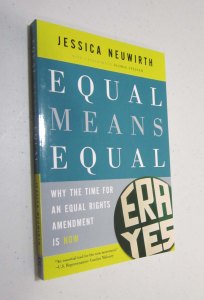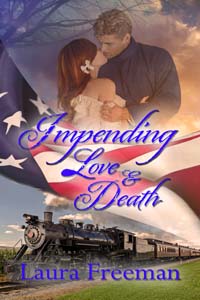I didn’t realize women’s rights were not protected by the U.S. Constitution. Did you?
link http://goo.gl/JvgGJM
Writer Jessica Neuwirth hopes to see Equal Rights Amendment ratified into law
by Laura Freeman | Reporter Published: September 27, 2015 12:20AM
Hudson — Although the Equal Rights Amendment was passed by Congress in 1972, only 35 states ratified it, three short of the 38 needed by the 1982 deadline. The ERA supporters hope a new generation of women will change that.
“Equal Means Equal: Why the Time for an Equal Rights Amendment is Now,” written by Jessica Neuwirth, shows how women’s rights have been compromised without the protection of an ERA.
“Many people thought we already had the ERA,” Neuwirth said. “More than 70 percent think it passed and is in the Constitution. More than 90 percent think there should be a constitutional guarantee. We have an information gap. We don’t have equal rights in our Constitution.”
Neuwirth, founder of the international women’s rights organization Equality Now and former director of the New York branch of the Office of the United Nations High Commissioner for Human Rights, spoke to more than 75 men and women at the Hudson Library & Historical Society Sept. 21 as part of the library’s Libby Walker Women’s Studies Lecture Series.
The book, which includes a foreword by long-time women’s rights activist Gloria Steinem, examines topics like pay equity, pregnancy discrimination, and violence against women and argues the need for an Equal Rights Amendment.
The 14th amendment to the U.S. Constitution provides equal protection under the law and was passed in 1868, Neuwirth said. It wasn’t until 52 years later that the 19th amendment, which gave women the right to vote, was passed, in 1920.
The ERA was drafted in 1923 so women would have all equal rights, but the time limit for passage by the states expired.
Earlier this summer, actress Meryl Streep sent each member of Congress a personally signed letter along with a copy of Neuwirth’s book urging them to revive the Equal Rights Amendment.
“We need the ERA,” Neuwirth said. “Equal means equal but the legal framework we have now is not working for women who suffer gender-based injustice.
“The Supreme Court upheld pregnancy discrimination stating it did not constitute sex discrimination even though only women can get pregnant,” she said.
The court reasoned if pregnant women were treated differently than pregnant men, then it would be sex discrimination, Neuwirth said.
Women can be paid less for the same job, same experience, etc., because the courts reasoned she made less in her prior job than a man, Neuwirth said.
“Two people doing the same job can get paid differently if they were paid differently in a previous job,” she said. “There is no legal recourse.”
Some people argue they have seen improvements over the years, but sex discrimination still exists, she said.
“For decades, women have earned 77 cents to the dollar earned by men; today it’s 78 cents,” Neuwirth said.
Without an Equal Rights Amendment, women do not have effective legal recourse against discrimination on the basis of sex because the U.S. Constitution does not prohibit sex discrimination, Neuwirth said.
In Ohio, which ratified the original amendment, only five current U.S. representatives support the ERA: Joyce Beatty, Tim J. Ryan, Marcy Kaptur, Marcia L. Fudge and Sherrod Brown. Neuwirth urges citizens to write, email and meet personally with members of Congress and urge support of the ERA amendment.
“This campaign could be short and sweet,” Neuwirth said. “It should have happened a long time ago, only no one knows it didn’t happen.”
For information on the ERA go to www.eracoalition.org and eraeducationsproject.com.
Neuwirth is one of the founders and Honorary President of the international women’s rights organization, Equality Now. She has also worked in the United Nations Office of Legal Affairs and as director of the New York Office of the High Commissioner for Human Rights. She served as a special consultant on sexual violence to the International Criminal Tribunal for Rwanda and a Special Advisor on Sexual Violence to the UN High Commissioner for Human Rights. As a guest lecturer, she taught international women’s rights at Harvard Law School. She holds a J.D. from Harvard Law School and a B.A. in History from Yale University.
How to pass the ERA amendment
Congress can eliminate the 1982 deadline for the ratification of the equal rights amendment and with three additional states, pass it, but the change to the deadline could be challenged in the Supreme Court, Jessica Neuwirth said.
The other solution is to start with a new amendment which has been proposed in the Senate:
“Section 1. Equality of rights under the law shall not be denied or abridged by the United States or by any State on account of sex.
Section 2. The Congress shall have the power to enforce, by appropriate legislation, the provisions of this article.
Section 3. This article shall take effect 2 years after the date of ratification.”
The amendment in the House of Representatives is worded differently and includes the term “women” for the first time in any amendment to the Constitution:
Section 1. Women shall have equal rights in the United States and every place subject to its jurisdiction. Equality of rights under the law shall not be denied or abridged by the United States or by any State on account of sex.
Section 2. Congress and several States shall have the power to enforce, by appropriate legislation, the provisions of this article.
Section 3. This amendment shall take effect two years after the date of ratification.
Email: lfreeman@recordpub.com
Phone: 330-541-9434
Twitter: @LauraFreeman_RP
 author Nancy Pickard; literary agent Vicki Selvaggio and forensic psychiatrist Dr. Megan Testa.
author Nancy Pickard; literary agent Vicki Selvaggio and forensic psychiatrist Dr. Megan Testa. ve and War,” last year, and it was released in October. The day before taping the show Aug. 19, I finished the final edits on my second novel, “Impending Love and Death,” and sent it back to my editor to begin production, so the timing couldn’t have been better.
ve and War,” last year, and it was released in October. The day before taping the show Aug. 19, I finished the final edits on my second novel, “Impending Love and Death,” and sent it back to my editor to begin production, so the timing couldn’t have been better.
